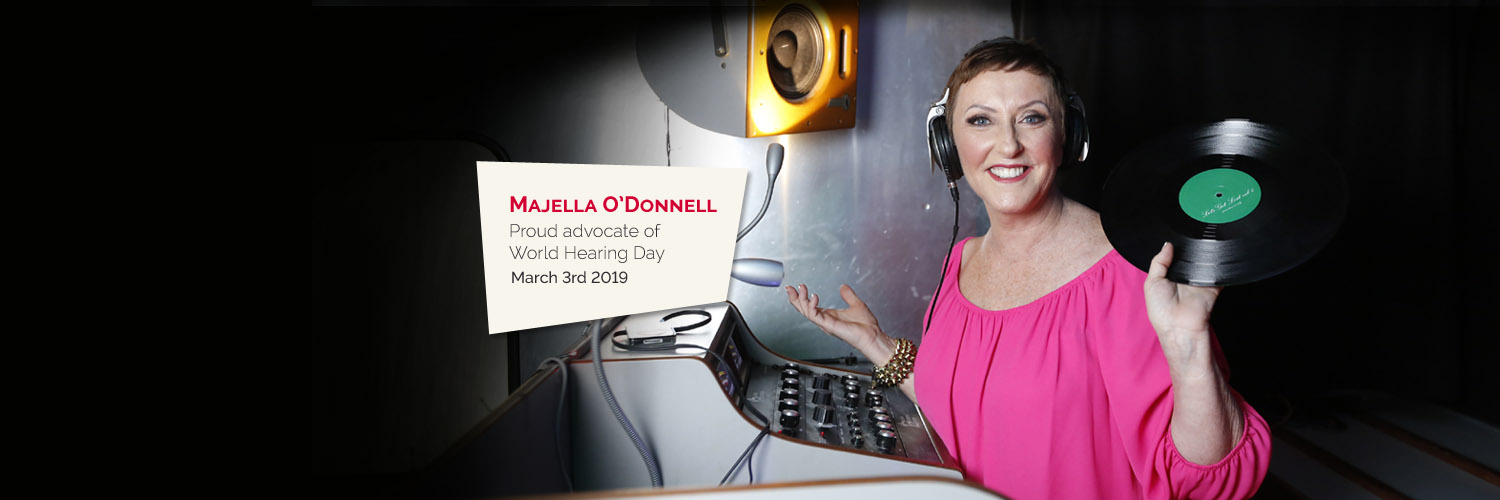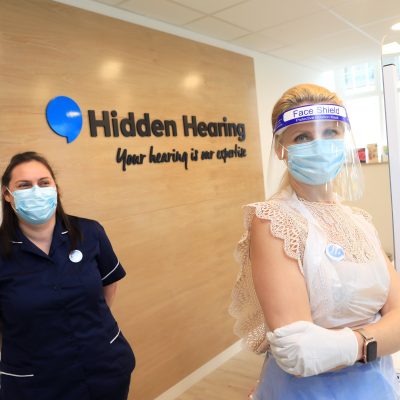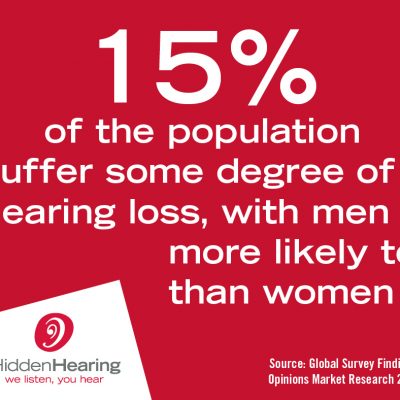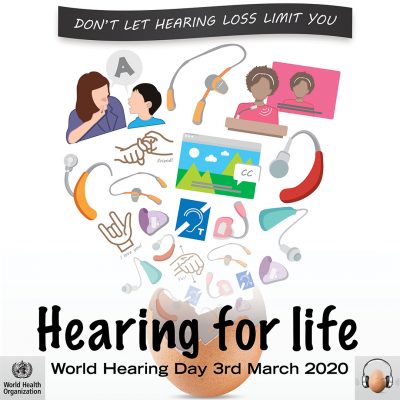
Omagh woman’s luck changes as she finally regains her hearing thanks to Campaign for Better Hearing

Hidden Hearing is GIVING BACK!
Northern Ireland Tops Other Countries in Hearing Healthcare
A global survey for World Hearing Day on Sunday 3 March has revealed that those living in the UK & Northern Ireland are among the most proactive when it comes to looking after their hearing health.
The research, co-ordinated in Northern Ireland & the UK by Hidden Hearing, was carried out among people experiencing hearing issues. It showed people here were among the most prompt in the world for having their hearing tested and seeking treatment, where necessary.
Almost two thirds (63%) sought medical advice within 6 months or less of noticing an issue. The UK & Northern Ireland, the Netherlands and Canada were the better markets in terms of seeking medical advice promptly. The Republic of Ireland, New Zealand and Australia left it much longer, with 22% in the Irish Republic waiting five years or more before addressing their hearing loss, the highest figure for treatment delay.
The main prompt for UK & Northern Ireland survey respondents in realising their hearing was not good was difficulty with conversations (61%). Having to turn the volume up on the TV or radio (57%) and not hearing the doorbell or phone ringing (31%) were also problematic.
A visit to their GP to discuss their hearing problem was the first type of help sought by 75% of UK & Northern Ireland respondents.
Of those who did not seek advice for a year or more, the main reason for delaying was because they thought hearing loss was a fact of ageing and could not be helped (36%). A further 35% said they didn’t realise their hearing was deteriorating.
Surprisingly, 25% said they were embarrassed to report their hearing loss, and 14% admitted they were put off by the prospect of wearing a hearing aid. Affordability of treatment was an issue for just 10% of UK respondents.
Among those aware of their hearing loss in the UK & Northern Ireland, 70% had had a hearing test in the previous 3 years, with the remainder planning to have a test in the next year. Globally just under 65% had been tested in the previous three years.
The most common age range in which UK & Northern Ireland respondents noticed a hearing loss was aged 25-44 (57%), which was a lower age cohort than the global reporting, where people generally became aware of a hearing problem when aged between 45 and 54.
Globally, for over 7 in 10 of the population with hearing loss (72%), a hearing aid was part of their treatment. For 22%, removal of a wax blockage improved their hearing, while 12% underwent a surgical procedure, and 9% had cochlear implants.
Those in the UK & Northern Ireland have a higher than average usage of hearing aids, at 83%, and are also more likely, at 11%, to have a cochlear implant versus the global average.
World Hearing Day, held on 3 March each year, is designed to promote ear and hearing health and to raise awareness of how to prevent hearing loss.
Quality of Life Impaired
The global survey examined many aspects of behaviour and attitude in relation to hearing loss. It was intended to identify barriers to good hearing healthcare in order to address them, according to the Belfast based Commercial Director of Hidden Hearing, Ken Viney.
“Our hearing fundamentally affects our quality of life, so it is reassuring to see that Northern Ireland and indeed UK survey respondents were among the best in addressing hearing loss and having treatment”, Ken Viney said.
The poor hearing has implications for an individual’s health and safety, as well as that of others, and medical research has identified significant links to conditions like dementia, diabetes, poor heart health and depression.
Awareness of the consequences of untreated hearing loss was also assessed in the Hidden Hearing research and revealed that people in the UK & Northern Ireland were largely unaware of the knock-on health issues.
Just 16% of hearing-impaired people in the UK & Northern Ireland recognised a link between dementia and hearing loss, with similarly low levels of awareness of connections to heart health (23%), stroke (23%) and diabetes (22%).
The hearing healthcare research also included the perspective of relatives of people with poor hearing. Here, better awareness was reflected in the UK sample of relatives, who correctly judged depression (57%) and dementia (43%) as being linked to hearing loss, with above-average awareness of connections to poor heart health (48%), diabetes (48%), and stroke (38%).
A recent study published by the University of Manchester revealed that using a hearing aid can slow to the onset of dementia by up to 75%.
Patients with diabetes are more than twice as likely to have hearing loss, according to studies at the U.S. National Institutes of Health, the largest biomedical research agency in the world.
Research in the Medical College of Wisconsin has shown that, because the inner ear is so sensitive to blood flow, abnormalities in the cardiovascular system are noted in connection with hearing loss.
The American Heart Association identified a link too between sudden onset of hearing loss and stroke, which is being investigated.
Relative Awareness
Families can have an important impact in ensuring relatives’ hearing problems are promptly identified and treated.
7 in 10 (71%) family members questioned in the UK & Northern Ireland about their relatives’ hearing loss said they had noticed the problem before the person sought treatment. Over two thirds (67%) admitted they felt their relative was ignoring the problem.
81% of UK & Northern Ireland respondents claimed to have addressed the hearing loss with their relative, and recommended a hearing test, and, of those, 82% said their relative acted on the advice to get checked.
Of the 19% who didn’t bring up the hearing loss problem with their relative, half said they were not comfortable addressing the subject, and half felt the individual would not do anything about it.
Feelings
The feelings ranked strongest in association with hearing loss, globally, were anxiety (69%) and exhaustion (69%) from trying to follow conversations.
In the UK, 68% of those surveyed admitted feeling exhausted trying to cope with conversation, on account of their hearing difficulty.
59% were angry or frustrated some or most of the time, and 68% reported feeling socially isolated. 72% said they felt anxious and 49% reported feeling unsafe on occasion because of their hearing loss.
The 2019 Global Hearing Loss Survey was carried out among adults aged 18 and over, already with hearing issues, as well as family members of those with a hearing problem.
The ten countries in which the survey was carried out were the UK & Northern Ireland, The Republic of Ireland, Portugal, France, Spain, the Netherlands, New Zealand, the USA, Canada and Australia.
Hidden Hearing Northern Ireland is part of the global ‘Campaign for Better Hearing’ supported locally by Daniel and Majella O’Donnell, and designed to educate the public on taking care of their hearing.
The campaign encourages everyone over the age of 50 to book a free hearing test, and the Hidden Hearing ‘Give Back’ programme fits complimentary hearing devices for deserving recipients.
The company also supports the Bridging the Gap programme by the National Deaf Children’s Society (NDCS), which aims to empower and encourage deaf children and their families to contribute meaningfully to their community in Northern Ireland.
Hidden Hearing branches offer help and advice to anyone worried about hearing loss. To book a free consultation in one of Hidden Hearing, Northern Irelands’ clinics, click here. You can also locall 0800 085 95 50.




